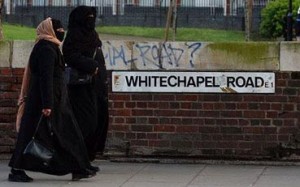Be careful what you wish for.
British voters in 1997 were so fed up with two decades of Tory privatisation under Thatcher-Major, that when charismatic overpromising Blair spung up with ‘New Labour’, the voters surrendered too much electoral mandate. Rudd Labor plagiarised and followed suit in Australia in 2007 – no media noticed the copyright breach?
True to form, when the LibLab (or ‘Tory-Labor’), Blair Labour faction got voted in, they abused the electoral mandate and let in 3 million immigrants to invade Britain, in defiance of the overwhelming wishes of the British people.
Tragically, nearly one million Britons voted with their feet, and emigrated from the Blair directed invasion, many saying that they were leaving because England was no longer a country that they recognised.
What nations face this?
When a nation’s indigenous are compelled to flee their homeland, in any one’s definition, invasion has been cemented and complete. At least, poor old Harold of Wessex died trying to save Britain from foreign invaders. Blair invited ’em in!
Andrew Neather, a previously unheard-of speechwriter for Blair, Straw and Blunkett, popped up with an article in the Evening Standard in October 2009 explained:
‘How 3 million migrants came to UK under Labour in the biggest population growth in 1,000 years’
Immigration, Neather wrote, ‘didn’t just happen; the deliberate policy of Labour Ministers from late 2000 . . . was to open up the UK to mass immigration’.
He was at the heart of policy in September 2001, drafting the landmark speech by the then Immigration Minister Barbara Roche, and he reported ‘coming away from some discussions with the clear sense that the policy was intended — even if this wasn’t its main purpose — to rub the Right’s nose in diversity and render their arguments out of date’.
That seemed, even to him, a manoeuvre too far.
The result is now plain for all to see. Even Blair’s favourite think tank, the Institute for Public Policy Research (IPPR), commented recently: ‘It is no exaggeration to say that immigration under New Labour has changed the face of the country.’
It is not hard to see why Labour’s own apparatchiks supported the policy. Provided that the white working class didn’t cotton on, there were votes in it.
Research into voting patterns conducted for the Electoral Commission after the 2005 general election found that 80% of Caribbean and African voters had voted Labour, while only about 3 per cent had voted Conservative and roughly 8% for the Liberal Democrats.
The Asian vote was split about 50% for Labour, 10% Conservatives and 15% Liberal Democrats.
Nor should we underestimate the power of ‘community leaders’ who have strong influence in constituency Labour parties and who, of course, benefit from a growth in numbers.
Other activists, nurtured in the anti-apartheid movement of the last century, had no difficulty promoting the interests of minority groups — almost, it seems, regardless of the impact on the white working class.
There were also economic factors. A collection of essays published recently by the IPPR underlined the role of Gordon Brown’s Treasury in this affair. A high level of immigration made economic growth look better and helped keep wages and, therefore, inflation down.
Others, too, saw economic benefits for themselves. The employers’ organisations kept their heads down, but there is little doubt that they were privately encouraging a supply of cheap labour which was good for profits, whatever its impact on society.
Then there were those members of the middle classes who found it convenient to have cheap exotic restaurants and even cheaper domestic help, but were blind to the wider consequences of this population inflow which were, of course, felt in the poorer neighbourhoods.
Another major factor was the attitude of the BBC and, in particular, its devotion to multiculturalism. For years it avoided discussing immigration if it possibly could.
Although in the autumn of 2005 official statistics for the previous year showed an increase of 50% in net immigration, there was no mention of this on the BBC. Its own report into impartiality, published in June 2007, concluded that its coverage of immigration amounted to bias by omission.
Last December the corporation’s director-general admitted: ‘There are some areas, immigration, business and Europe, where the BBC has historically been rather weak and rather nervous about letting that entire debate happen.’ Indeed so.
The overall effect was to deter any serious discussion of immigration and to give plenty of space to the Left to accuse anyone who raised the subject of being a covert racist. On this matter the BBC failed to meet its own standards of objectivity.
How about Labour’s competence in government? A succession of six home secretaries and eight ministers of immigration was a testament to their utter failure to focus on a subject of crucial importance to Britain’s future.
Labour ministers had no sooner grasped the elements of the problem than they were moved to a new post. Government policy was that immigration was good for the economy, so why make difficulties about it?
The first Labour Home Secretary even to inquire about the numbers was Jacqui Smith. But she, too, was gone in the twinkling of an eye.
The reality is there was no government focus on the scale of immigration and no serious effort made to reduce it.
In the end, Labour paid the price. But worse, Britain has paid the price. Immigrants are permanent – try expelling them!
Jacqui Smith was the first Home Secretary to question the figures. Tony Blair appears to show no remorse over the huge amount of migration.
Anger over mass immigration was a major reason why so many of Labour’s working-class supporters did not vote at the last election.
They were not alone in their verdict. An intriguing opinion survey found that, when the public were asked what they regarded as the greatest failures of Tony Blair’s time as Prime Minister, 62 per cent pointed to the fact that immigration had reached unacceptable levels — even more than the 56 per cent who chose the invasion of Iraq.
Blair himself shows no remorse. His memoirs, which run to 690 pages, contain only one page on immigration.
The reference describes his strategy for handling the policy at the 2005 election, saying: ‘Because our position was sophisticated enough — a sort of “confess and avoid”, as the lawyers say — we won out.’
If Blair thinks his immigration policy was a success, he is almost alone. Anger over mass immigration was a major reason why so many of Labour’s working-class supporters did not vote at the last election. Labour’s ‘whatever it takes’ machiavellianism has switched its allegiance from the Blue Collar to the Head Scarf.
 Tony Blair’s Sharia Britain legacy – the Saudi Fashion Sux
Tony Blair’s Sharia Britain legacy – the Saudi Fashion Sux
Under Blair Britain’s Border Agency lost track of more than 150,000 immigrants who were refused permission to stay in Britain. Current Immigration Minister Damian Green has blamed the previous Blair-Brown Labour Government for failing to put an “effective strategy” in place to keep track of immigrants after they had been ordered to leave the country.
No wonder there have been riots in the streets. Britain is stuffed. It has opened its borders to the Slave Third World hordes and now it is overrun, unrecognisable, welfare-ridden and shite.
Foreign workers have changed the national identity. Indigenous Britons are set to become a minority in their own nation state by 2066. Figures from the Office of National Statistics show that if immigration remains at a long-term rate of around 180,000 a year the proportion of the white British-born population (defined as English, Welsh, Scottish and Irish-born citizens) will fall from 80% cent to 59% by 2051.
This is because the Third Worldists know how to breed. In that time the white immigrant population will have risen from four to 10%, whereas the ethnic minority population from 16% to 31%.
The latest Tory Prime Minister David Cameron may well stretch London’s successful hosting of the 2012 Olympics to “Britons (taking on) a newfound pride in their national identity”. He rants “you see what Britain is today: sure of who we are, proud of who we are,’ he added. ‘In short, not a country whose time has been but whose time has come.’
“Over the last couple of weeks we have looked in the mirror and we like what we have seen as a country.”
But beyond the 16 day flash in the pan of the 2012 Olympics, beyond London Olympic Park, into East London’s multicultural reality and the welfare reality of the rest of the country, the mirror reveals ugly poverty across the masses.
